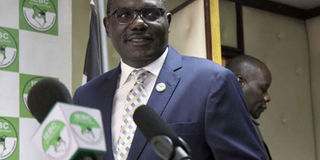IEBC mistakes to cost taxpayers billions of shillings

Independent Electoral and Boundaries Commission chairman Wafula Chebukati addresses journalists at Anniversary Towers in Nairobi on September 1, 2017. IEBC will incur more costs when conducting a presidential election rerun. PHOTO | EVANS HABIL | NATION MEDIA GROUP
What you need to know:
- The printing of ballot papers and statutory result declaration forms cost about Sh2.5 billion.
- The commission also hired Bomas of Kenya and other polling and tallying centres.
Billions of shillings have gone down the drain as mistakes of the electoral commission are now set to send the country back to the polls.
The majority ruling of the Supreme Court indicted the Independent Electoral and Boundaries Commission (IEBC) for having “failed, neglected or refused to conduct the presidential election in a manner consistent with the dictates of the constitution and inter alia the Elections Act, Chapter 7 of the Laws of Kenya”.
The judges also found that IEBC had “committed irregularities and illegalities, inter alia, in the transmission of results”, the sum of which could give rise to criminal prosecution of the staff involved.
VOTERS' REGISTER
Even though the exact cost of the August 8 poll remains hazy, the amount runs into tens of billions of shillings spent on auditing of the voter register, cost of acquiring the Kenya Integrated Elections Management System (Kiems), the ballot papers and hiring of poll clerks and other consultants.
For instance, audit of the voters’ register, which was criticised by the opposition and civil society groups, according to IEBC chairman Wafula Chebukati, cost the taxpayer some Sh160 million.
Despite the millions spent to clean up the register, there are still doubts whether the original intention of expunging dead and irregularly registered voters from the register was achieved.
KIEMS KITS
Meanwhile, the printing of ballot papers and statutory result declaration forms, which had been seriously contested by Nasa, cost about Sh2.5 billion.
Despite allegations about the links between the printer, Dubai’s Al Ghurair Printing & Publishing, and President Uhuru Kenyatta, IEBC pressed ahead to award the company the tender, which cost some Sh2.5 billion.
As well as the ballot papers, the Kiems kits, which were to be used to identify voters as well as capture and transmit scanned results forms, seems to have been a waste.
The kits cost an estimated Sh5.2 billion.
POLLS STAFF
Besides these costs, IEBC is also set to spend billions to pay 362,858 temporary staff, which the commission hired and deployed as ICT support staff, security officers, returning officers, presiding officers and poll clerks on August 8.
Each polling clerk was to be paid Sh9,000, which the Sunday Nation understands has not been done close to a month after the elections.
In the run-up to the August 8 elections, IEBC held countless press conferences and interviews assuring the public of its readiness to oversee the polls, including the presidential election, which, as per the Supreme Court determination, “was not conducted in accordance with the Constitution and the applicable law rendering the declared result invalid, null and void”.
CAMPAIGNS
For instance, 32 days to the August elections, Mr Chebukati, in a press statement, said that “preparations have been within the timelines”.
In conducting fresh elections, the commission will again have to hire the services of temporary staff, more or less to the same level as they did in the August 8 polls.
Besides the costs of the temporary staff, just a week to the elections, IEBC contracted Scanad Kenya Ltd, which had quoted Sh764.4 million for strategic communications and media campaigns, which included among others, traditional and social media campaigns and voter education.
TENDER
The tender has been the subject of a court battle with one of the bidders, Transcend Media Group, which had quoted Sh477.4 million.
The Sunday Nation understands that the tender was awarded just a week before the elections, raising questions about the rationale of awarding nearly a billion shillings tender just a week or so to the polls.
As well as the costs above, IEBC had engaged the services of the Postal Corporation of Kenya to distribute election materials from its warehouse based in Nairobi’s Industrial Area and taken either to the county or constituency headquarters.
BOMAS
From the regional headquarters, IEBC had also hired private transport companies to transport the election materials to polling stations.
The commission also hired Bomas of Kenya and other polling and tallying centres.
In light of the Supreme Court ruling that IEBC failed to adhere to the constitutional and legal dictates in conducting the elections, a good percentage of these costs have gone down the drain.




